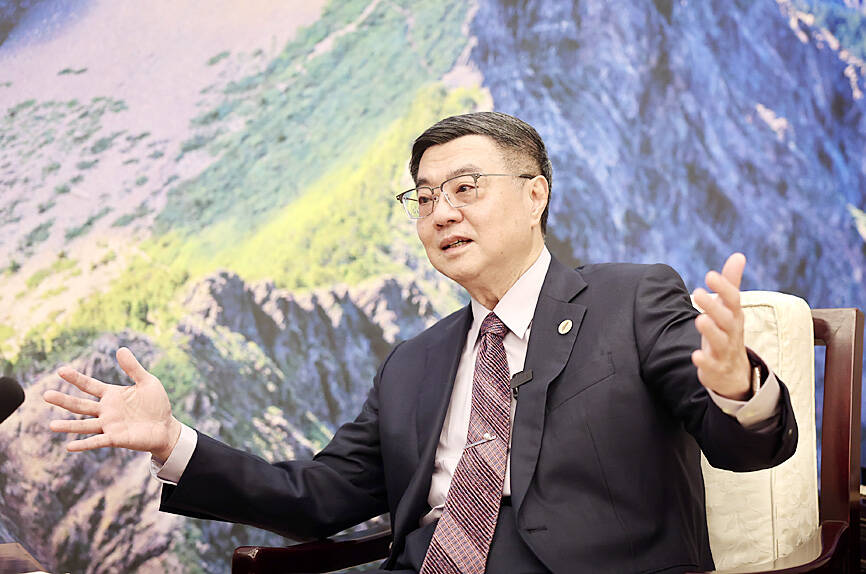Preparations to tackle espionage, infiltration, propaganda and other national security threats from China are under way, Premier Cho Jung-tai (卓榮泰) said on Friday.
The Cabinet has identified more than 100 measures and revisions to the law to better address Chinese threats after President William Lai (賴清德) convened a national security meeting in the middle of March, Cho said in an interview with the Central News Agency.
Following the meeting, Lai pledged to reinstate military courts, restrict private-sector exchanges across the Taiwan Strait, expand screenings of cross-strait flows of talent, goods and capital, as well as work with partner countries to reject Beijing’s claims over Taiwan.

Photo: CNA
Lai raised the alarm over the growing number of former and active-duty military personnel in Taiwan who have been accused or indicted for spying for China in the past few years, while investigations of alleged spying by aides of senior Democratic Progressive Party (DPP) government officials have also sparked concern.
One of the aides was Ho Jen-chieh (何仁傑), who worked for Joseph Wu (吳釗燮) when he was National Security Council secretary-general from May 2016 to May 2017, Presidential Office secretary-general from May 2017 to February 2018 and minister of foreign affairs from 2018 to last year.
Other suspects in the Ho case include Wu Shang-yu (吳尚雨), who worked as an adviser in Lai’s office; Chiu Shih-yuan (邱世元), former deputy head of the DPP’s Taiwan Institute of Democracy; and Huang Chu-jung (黃取榮), an aide to DPP New Taipei City Councilor Lee Yu-tien (李余典).
Among the measures identified by the Cabinet, priority would be given to reforming rules for special background checks for people who have access to classified government information, Cho said, adding that Chinese espionage within the DPP government was unacceptable.
He did not provide details on what the reforms would involve.
The reforms would first be implemented in the Executive Yuan, he said, adding that he hoped the legislature would follow suit.
It is common for legislators to ask for sensitive information from the executive body and their assistants often have access to it, too, he said.
The government has always welcomed healthy and sustainable cross-strait exchanges, but action is needed to combat Chinese “united front” work and infiltration, as well as other threats, Cho said.
Turning to US relations, Cho said that labeling regulations for “Made in Taiwan” (MIT) products are a major topic of discussion in negotiations with Washington over the “reciprocal” tariffs policy of US President Donald Trump’s administration.
Given the close economic exchanges between Taiwan and China, one of the key issues in the negotiations is how to prevent Chinese exports from evading US tariffs by being rerouted through Taiwan and falsely labeled as MIT products, which could harm Taiwan’s industrial interests, Cho said.

The manufacture of the remaining 28 M1A2T Abrams tanks Taiwan purchased from the US has recently been completed, and they are expected to be delivered within the next one to two months, a source said yesterday. The Ministry of National Defense is arranging cargo ships to transport the tanks to Taiwan as soon as possible, said the source, who is familiar with the matter. The estimated arrival time ranges from late this month to early next month, the source said. The 28 Abrams tanks make up the third and final batch of a total of 108 tanks, valued at about NT$40.5 billion

Two Taiwanese prosecutors were questioned by Chinese security personnel at their hotel during a trip to China’s Henan Province this month, the Mainland Affairs Council (MAC) said yesterday. The officers had personal information on the prosecutors, including “when they were assigned to their posts, their work locations and job titles,” MAC Deputy Minister and spokesman Liang Wen-chieh (梁文傑) said. On top of asking about their agencies and positions, the officers also questioned the prosecutors about the Cross-Strait Joint Crime-Fighting and Judicial Mutual Assistance Agreement, a pact that serves as the framework for Taiwan-China cooperation on combating crime and providing judicial assistance, Liang

A group from the Taiwanese Designers in Australia association yesterday represented Taiwan at the Midsumma Pride March in Melbourne. The march, held in the St. Kilda suburb, is the city’s largest LGBTQIA+ parade and the flagship event of the annual Midsumma Festival. It attracted more than 45,000 spectators who supported the 400 groups and 10,000 marchers that participated this year, the association said. Taiwanese Designers said they organized a team to march for Taiwan this year, joining politicians, government agencies, professionals and community organizations in showing support for LGBTQIA+ people and diverse communities. As the first country in Asia to legalize same-sex

MOTIVES QUESTIONED The PLA considers Xi’s policies toward Taiwan to be driven by personal considerations rather than military assessment, the Epoch Times reports Chinese President Xi Jinping’s (習近平) latest purge of the Chinese People’s Liberation Army (PLA) leadership might have been prompted by the military’s opposition to plans of invading Taiwan, the Epoch Times said. The Chinese military opposes waging war against Taiwan by a large consensus, putting it at odds with Xi’s vision, the Falun Gong-affiliated daily said in a report on Thursday, citing anonymous sources with insight into the PLA’s inner workings. The opposition is not the opinion of a few generals, but a widely shared view among the PLA cadre, the Epoch Times cited them as saying. “Chinese forces know full well that